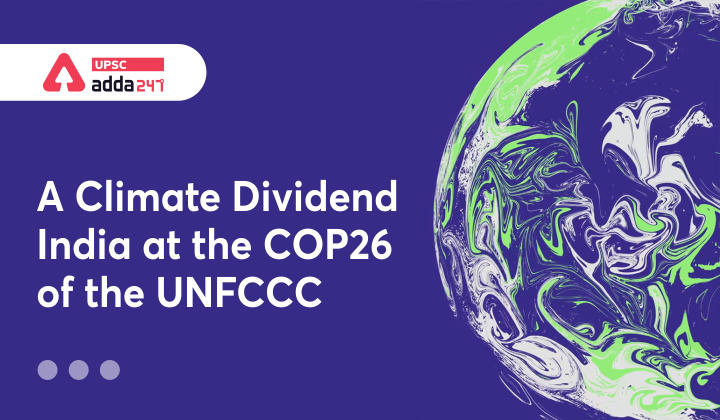Table of Contents
A Climate Dividend- Relevance for UPSC Exam
- GS Paper 2: International Relations- Bilateral, regional and global groupings and agreements involving India and/or affecting India’s interests.
- GS Paper 3: Environment- Conservation, environmental pollution and degradation.
A Climate Dividend- Context
- India may face pressure at the COP26 of the UN Framework Convention on Climate Change in Glasgow for adopting a timeline for Net Zero carbon dioxide emissions.
- India is adopting the stand that a national deadline for net-zero carbon dioxide emissions is uncalled for.
- India still has very per capita emissions in comparison to other developed countries like the USA and European Countries.
UN Glasgow Climate Change Conference (COP 26)
A Climate Dividend- Expected outcomes Glasgow Conference
- Global Carbon Budget: Remaining carbon budget calculated at between 420-580 Gigatonnes of CO2 for achieving the Paris Climate Goals.
- Big Emitters: China, the U.S. and the EU collective, representing the highest emissions, are expected to occupy a big share of the remaining budget.
- India’s Stand: India will again rely on its historical energy poverty, underdevelopment and low per capita emissions to convince the world that a net-zero target is incongruous with the present reality.
A Climate Dividend- Way Forward
- Sharing the global carbon budget: Countries must responsibly share the carbon budget in order to keep the global average temperature rise within safe limits- well below 2° C or 1.5° C under the Paris Agreement.
- India should avoid taking a minimalist approach: in order to minimize global repercussions of climate change and India’s own alarming losses from periodic extreme weather events.
- Cooperation and Convergence with the World: India can seek convergence with the world on-
- Identifying green growth pathways, aligning future investments with a smart recovery plan for COVID-19,
- Embracing renewable energy more widely and averting long-term lock-in effects of fossil fuel dependence in energy generation, buildings, mobility and so on.
- Fulfilling Commitment: Rich countries must deliver on the promised $100 billion a year from 2020 to help poor nations adapt to climate change.
- Multi-sectoral energy transition: India should follow this approach to reduce the impact of climate change.
16th East Asia Summit (EAS) 2021
A Climate Dividend– Conclusion
- It is essential for governments to draw up precise technological, socio-economic, and financial policies and requirements to demonstrate a commitment to the 1.5° C goal.
- India must seize the moment and present convincing plans that will be rolled out in the present decade in order to attract climate finance, even while buttressing the argument for a medium-term window to taper down carbon emissions.




 TSPSC Group 1 Question Paper 2024, Downl...
TSPSC Group 1 Question Paper 2024, Downl...
 TSPSC Group 1 Answer key 2024 Out, Downl...
TSPSC Group 1 Answer key 2024 Out, Downl...
 UPSC Prelims 2024 Question Paper, Downlo...
UPSC Prelims 2024 Question Paper, Downlo...
